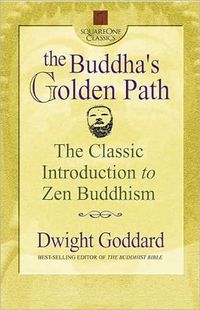
Buddha's Golden Path: The Classic Introduction To Zen Buddhism
In 1929, when author Dwight Goddard wrote The Buddha's Golden Path, he was breaking ground. No American before him had lived the lifestyle of a Zen Buddhist monk, and then set out to share the secrets he had learned with his countrymen. This title was the first American book published to popularize Zen Buddhism. Released in the midst of the Great Depression, in its own way, it offered answers to the questions that millions of disillusioned people were beginning to ask--questions about what was really important in their lives. Questions we still ask ourselves today. As a book of instruction, The Buddha's Golden Path has held up remarkably well. As a true classic, it has touched countless lives, and has opened the door for future generations in this country to study and embrace the principles of Zen.
Dwight Goddard was a pioneer in the American Zen Buddhist movement. He was born in Worcester, Massachusetts in 1861. After graduating from college as an industrial engineer, he made his fortune in service to the United States Government during World War I. Greatly disillusioned by the brutality of war, Goddard became a missionary for the American Board. He was sent first to China, and later to Japan, where he lived in and studied at a Zen Buddhist monastery outside Kyoto for nearly one year. In 1924, having moved back to the States, he began writing books on Buddhism. By the time of his death in 1939, he had authored and edited nine titles, among them, The Buddhist Bible, the book credited with influencing the views of Jack Kerouac, iconic Beat Generation author.
Utgiven: 2002
ISBN: 9780757000232
Förlag: Square One Publishing
Format: Häftad
Språk: Engelska
Sidor: 208 st
In 1929, when author Dwight Goddard wrote The Buddha's Golden Path, he was breaking ground. No American before him had lived the lifestyle of a Zen Buddhist monk, and then set out to share the secrets he had learned with his countrymen. This title was the first American book published to popularize Zen Buddhism. Released in the midst of the Great Depression, in its own way, it offered answers to the questions that millions of disillusioned people were beginning to ask--questions about what was really important in their lives. Questions we still ask ourselves today. As a book of instruction, The Buddha's Golden Path has held up remarkably well. As a true classic, it has touched countless lives, and has opened the door for future generations in this country to study and embrace the principles of Zen.
Dwight Goddard was a pioneer in the American Zen Buddhist movement. He was born in Worcester, Massachusetts in 1861. After graduating from college as an industrial engineer, he made his fortune in service to the United States Government during World War I. Greatly disillusioned by the brutality of war, Goddard became a missionary for the American Board. He was sent first to China, and later to Japan, where he lived in and studied at a Zen Buddhist monastery outside Kyoto for nearly one year. In 1924, having moved back to the States, he began writing books on Buddhism. By the time of his death in 1939, he had authored and edited nine titles, among them, The Buddhist Bible, the book credited with influencing the views of Jack Kerouac, iconic Beat Generation author.
Begagnad bok (0 st)
Varje vecka tillkommer tusentals nya säljare. Bevaka boken så får du meddelande när den finns tillgänglig igen.



